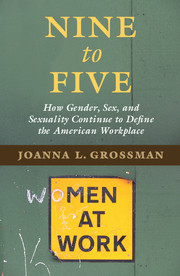Book contents
- Frontmatter
- Dedication
- Contents
- Foreword
- Acknowledgments
- Introduction
- PART I WHAT IS SEX DISCRIMINATION?
- PART II SEXUAL HARASSMENT
- 12 Workplace Affairs and Sexual Favoritism
- 13 Lolita at the Office
- 14 Sex Talk in the Writers’ Room
- 15 Sex Behind Bars
- 16 When the Supervisor Bullies Only Women
- 17 The Equal Opportunity Harasser
- 18 Periodontal Perils
- 19 Punishing Effeminacy
- 20 Late-Night Affairs with David Letterman
- 21 Why Herman Cain Has Not Been Able to Talk His Way Out of His Exploding Sexual Harassment Scandal
- 22 Why Hostile Environment Harassment Is a “Continuing Violation”
- 23 When Sexual Extortion Is Successful
- 24 The Consequences of Failing to Complain about Harassment
- 25 Who Is Responsible for Sudden, Severe Harassment?
- 26 Chinks in the Harassment Law Armor
- 27 Do Employer Efforts Prevent Harassment or Just Prevent Liability?
- 28 Who's the Boss?
- 29 Costly Mistakes
- 30 Hands Off the Merchandise
- PART III PREGNANT WOMEN AND MOTHERS AT WORK
- PART IV FEMALE BREADWINNERS AND THE GLASS CEILING
- Conclusion
- Notes
- Index
19 - Punishing Effeminacy
from PART II - SEXUAL HARASSMENT
Published online by Cambridge University Press: 05 May 2016
- Frontmatter
- Dedication
- Contents
- Foreword
- Acknowledgments
- Introduction
- PART I WHAT IS SEX DISCRIMINATION?
- PART II SEXUAL HARASSMENT
- 12 Workplace Affairs and Sexual Favoritism
- 13 Lolita at the Office
- 14 Sex Talk in the Writers’ Room
- 15 Sex Behind Bars
- 16 When the Supervisor Bullies Only Women
- 17 The Equal Opportunity Harasser
- 18 Periodontal Perils
- 19 Punishing Effeminacy
- 20 Late-Night Affairs with David Letterman
- 21 Why Herman Cain Has Not Been Able to Talk His Way Out of His Exploding Sexual Harassment Scandal
- 22 Why Hostile Environment Harassment Is a “Continuing Violation”
- 23 When Sexual Extortion Is Successful
- 24 The Consequences of Failing to Complain about Harassment
- 25 Who Is Responsible for Sudden, Severe Harassment?
- 26 Chinks in the Harassment Law Armor
- 27 Do Employer Efforts Prevent Harassment or Just Prevent Liability?
- 28 Who's the Boss?
- 29 Costly Mistakes
- 30 Hands Off the Merchandise
- PART III PREGNANT WOMEN AND MOTHERS AT WORK
- PART IV FEMALE BREADWINNERS AND THE GLASS CEILING
- Conclusion
- Notes
- Index
Summary
The U.S. Court of Appeals for the Ninth Circuit has done it again. It issued an opinion that sounds extreme, may be vulnerable to reversal by the Supreme Court, and, yet, is correct. The case was Rene v. MGM Grand Hotel, and the opinion was issued by an en banc panel – that is, a large panel of judges reconsidering an earlier, three-judge panel's decision. (Here, the three-judge panel had dismissed the claim.)
In Rene, the en banc panel held that a man harassed by his coworkers because he was gay could maintain an action for sexual harassment under Title VII. The plaintiff in the suit, Median Rene, is an openly gay man who worked as a butler in a Las Vegas hotel, on a floor reserved for high-profile and wealthy clients. According to his complaint and evidence obtained during discovery, Rene was subjected to a hostile environment by his fellow butlers, all male, over a two-year period.
THE SEXUAL ORIENTATION CONUNDRUM UNDER TITLE VII
Rene filed suit alleging that this harassing behavior violated his rights under Title VII, which prohibits discrimination (including harassment) on the basis of sex, but not on the basis of sexual orientation. Contrary to the views of former House Speaker John Boehner, whose spokesperson claims that he has “always believed this is covered by existing law,” current federal antidiscrimination law does not prevent employers from taking adverse employment actions against someone because he or she is gay. Every court to address the issue has held that Title VII does not prohibit sexual orientation discrimination, and Congress has failed to amend Title VII to add sexual orientation to its list of prohibited characteristics despite several bills that have been introduced over the years.
The first bill to include protections against sexual-orientation discrimination was introduced by Congresswoman Bella Abzug in 1974. That bill was broader than the current one, proposing broad protection for gays and lesbians against discrimination in employment, housing, and public accommodations. Throughout the 1970s and 1980s, similar bills were introduced, but none became law. In 1994, the first version of ENDA, a bill focused solely on protections against workplace discrimination, was introduced in the Senate by the late Senator Ted Kennedy, which held hearings on the bill. ENDA's express purpose is to fill the existing gap in federal antidiscrimination law for gays, lesbians, and transgender individuals.
- Type
- Chapter
- Information
- Nine to FiveHow Gender, Sex, and Sexuality Continue to Define the American Workplace, pp. 112 - 118Publisher: Cambridge University PressPrint publication year: 2016



